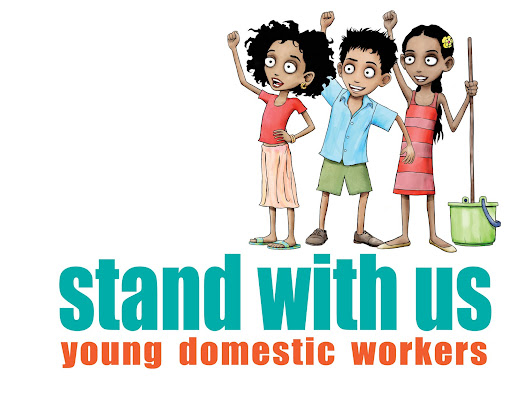Taken from the report Making it Work! How to protect child domestic workers from exploitation and abuse.
Long hours of work are a serious hazard for young domestic workers. Written agreements can eliminate the common practice of young domestic workers being ‘on call’ at all hours of the day and night - by stipulating set working hours and by banning the confinement of workers in the household during non-work hours.
Tackling isolation: The work carried out by young domestic labourers needs regular adult care and supervision. Young domestic workers are particularly vulnerable to injury when they are working long hours on their own. Written agreements can limit the number of hours a young domestic worker is required to work alone each day.
Physical danger: Because their bodies are still growing, young domestic workers are at risk of bone, tissue and muscle damage – some of which could be permanent – as a result of carrying heavy or awkward loads; repetitive or forceful actions, and working for long periods in unnatural or awkward body positions. Contracts can precisely articulate the tasks to be undertaken and time for adequate rest breaks.
The need for regular monitoring: Working conditions of young domestic workers can be examined and monitored regularly and improved if found detrimental to their health and safety. Alternatively, working adolescents can be moved to safer jobs and provided with opportunities to upgrade their vocational skills for better career prospects.
Examples:
In Sri Lanka, The National Child Protection Authority conducted a study into child domestic work, and, as part of the outcome, a task force developed a Code of Conduct for employment of young domestics. The Code covers such issues as occupational hazards from which young employees should be protected; working hours; holidays and leave; registration of employees, including their consent and that of their parents to the employment; the obligations of employers; and terms of payment including right to a minimum salary. Two lawyers also worked on a proposed amendment to the law governing the employment of persons aged between 14 and 18 years.
In Togo, a voluntary Code of Conduct has been developed for the employment of child domestic workers containing five key areas as follows:
- Minimum age: No working child should be under the age of 14 years.
- Working conditions, hazardous work and working environment: There should be a contract which stipulates tasks, hours, wages and conditions that will provide a healthy working environment.
- Methods of recruitment, responsibility of parents and communities: The need for parents to understand that traffickers’ promises concerning their children are false, and that employment far from home without family contact will hurt their children.
- Education and vocational training of the child: All employment of children must compulsorily include the education of children of school-going age and professional training for those who have finished school.
Many initiatives in Latin America have focused on the need for written contracts for domestic workers, for granting full employment rights, and fulfilling obligations according to the labour laws. Proper terms of employment include the legal minimum salary, days off on Sundays and Festivals, and stipulations for holidays and visits home.
In Colombia, a protection centre for women and families has developed a guide for domestic workers on all aspects of domestic employment, including pensions, social security, and health care entitlements.
In Honduras, as soon as a domestic worker becomes known to a local children’s centre, a note is sent to her employer explaining the project and inviting her to participate. Although few employers accept the invitation, those that do take part in training sessions dealing with the rights of domestic workers, along with their duties and obligations as employers.
Supporting young domestic workers in education:
In cases where children are legally allowed to work, relevant laws and agreements can state that any child of school-going age under the responsibility of alternative ‘upbringers’ is entitled to go to school, and to enjoy the same treatment in the home as the natural children of the household. This can be achieved through educational programmes designed to match child domestic workers’ capabilities, outlook on life, interests, and the practical requirements of their working life.
Drop-in centres for young domestic workers can support the personal development of working adolescents including basic literacy and numeracy classes, formal or non-formal education, skills training programmes, health services and legal counselling. And serve as places where adolescents can meet and socialize with peers.
Non-formal or catch up education programmes allow adolescents to bring their level of education up to speed so that they can make the transition into formal schooling.
Educational programmes that establish attainable goals for young domestic workers have been shown to work best. These goals may include reintegration into formal schooling, but alternatively may be geared towards life skills, self-reliance and personal growth in non-academic areas.
Examples:
In Costa Rica, ‘care centres’ have been set up to provide educational support for young domestic workers. Many child domestic workers in Costa Rica begin their Basic General Education, but are often expelled from school due to poor performance and difficulty in completing the academic year. The care centres encourage children's reintegration into the education system, and their retention in school, by giving educational reinforcement such as individual help and advice with studies and vocational assessment and guidance.
In Peru, young domestic workers attend recreational and self-improvement activities every Sunday at special 'casa' for domestic workers. Complementary educational services are offered: tutoring on school subjects, computer skills, English language classes, leadership workshops, cultural and recreation activities, negotiation skills. The 'casa' also helps to keep domestics in touch with their families in the countryside, by use of free phone calls and mail services.




